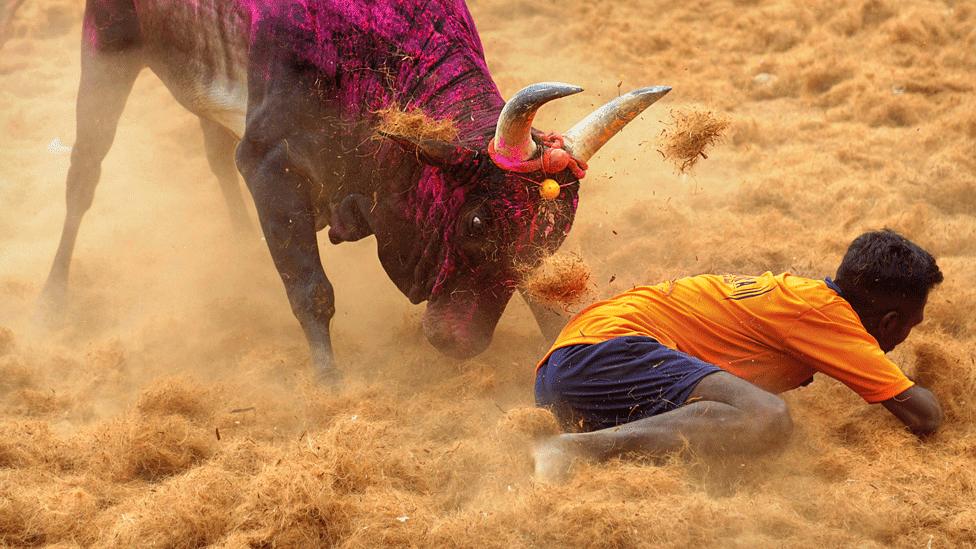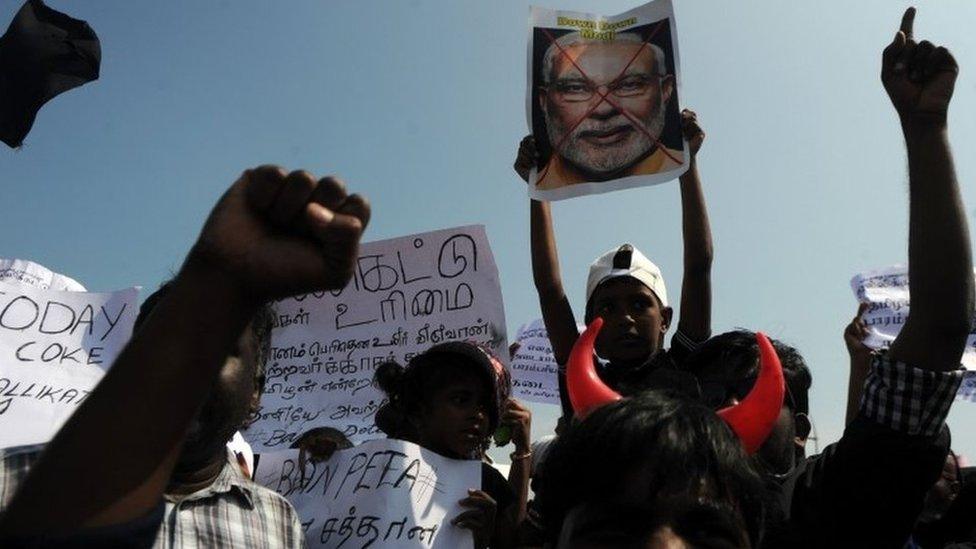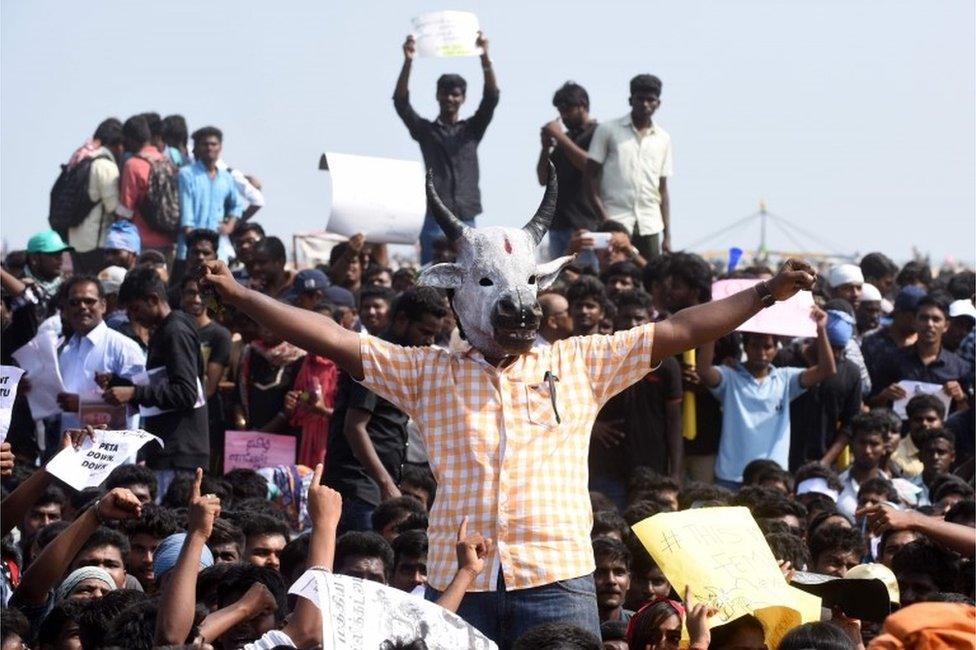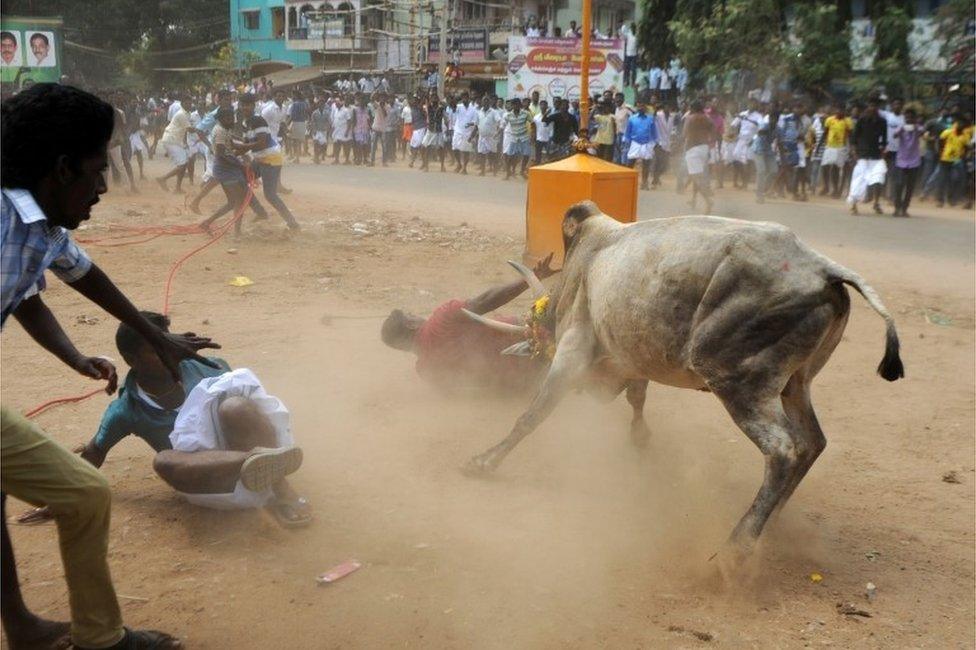Why India bull-taming protest may not be just about bulls
- Published

The sport is a 2,000-year-old tradition and a way of life with people
India, wrote author VS Naipaul, is a country of a million little mutinies, reeling with rage and revolt.
One such mutiny has brewed almost all of this week in southern Tamil Nadu state, where people have been protesting against a ban on a traditional bull-taming contest, known as jallikattu. They say the ban is an attack on their culture and identity.
On Saturday evening, a harried government scrambled to bring in a temporary law that would allow the sport to resume.
The protesters have been mollified for the moment, but most say they want a "permanent solution". The embers of this unique protest will continue to flicker because they were not merely about bulls alone.
For one, the recent protests were unique in the recent history of this thriving southern state, and even India.
Starting on Tuesday, tens of thousands of largely peaceful men and women - mostly students and workers - held an unprecedented beachside protest in the capital, Chennai.
They shared food and water, slept in the open, and cleaned up the beach in the morning. It was a remarkable exhibition of responsible public dissent, largely free of invective and incendiary rhetoric, which usually mark protests like these.
Outside the capital, millions protested across Tamil Nadu. Public transport was affected; schools, colleges and businesses were shut. Oscar-winning music composer and Tamil Nadu's most well-known celebrity, AR Rahman, fasted in support. Cricket and movie stars backed the movement. An overexcited newspaper report has even called it India's Arab Spring.
That may well be an exaggeration. But there is little doubt, as a local journalist says, that what began as small protests against the arrest of 200 young men opposing the ban last week snowballed into a "mass movement, leaderless and largely peaceful".
Thousands of sturdy, young men chase bulls - mostly owned by the temples - for prizes during jallikattu held during the harvest festival of Pongal in January. The animals are released from pens, with men supposed to hold on to the animal's hump for about 15-20 metres or three jumps of the bull to win the prize.
Animal rights activists, who support the ban, say the sport is cruel to animals. Nonsense, say the bull owners and supporters: the sport is a 2,000-year-old tradition and a way of life with people in large swathes of Tamil Nadu. They say the animals are, by and large, well looked after.

The protests have been spontaneous and leaderless
Opinions diverge greatly on the subject. Federal minister Maneka Gandhi has called the festival a day of "violence and killing" where "boys jump on each one (bulls) and try to tear its horns off". She wrote: "Everyone in India looks down upon it - as civilised people should."
Her comments have attracted a lot of flak. Shyam Krishnakumar, a research associate with Vision India Foundation, says: "This statement typifies a cosmopolitan elitism that considers itself to be modern and progressive and rural India to be backward and barbaric, in need of being saved.
"There is little effort taken to understand and sincerely engage with their lives and worldviews, there is merely the civilising mission to be force-fed to everyone, for their own good of course."
'Taking the bull by the horns'
Activists and bull owners have fought in the courts over the fate of the sport for more than a decade. In 2014, the Supreme Court banned it - and last year upheld the ban after a fresh challenge.
But the January protests - "taking the bull by the horns", as my favourite headline says - is unrivalled in recent memory.
They have been spontaneous and not led by any political party. They have cut across Tamil Nadu's often fractious caste and class lines. Participants include students, info-tech professionals, factory workers, farmers, anti-nuclear activists, and many other ordinary folk.
And the protests are no longer just about bulls. There are people angry with the recent currency ban and the shortage of cash that it caused. There is also angst about a controversial judicial order making it compulsory to play the national anthem in theatres and for audiences to stand when it is being played.
There are people who have protested against a nuclear plant in the state and against GM crops. There are irate drought-hit farmers who feel they are being deprived of their share of water from a river that their state shares with neighbouring Karnataka.

Protesters say the ban is an attack on Tamil tradition

Bull owners say that the animals are cared for
The protesters share, say many, deeper anxieties about what they feel are assaults on local traditions and cultures by the federal government, judiciary and elites in Delhi. Many of them say they are resisting attempts to "homogenise " India by federal fiats. The protests, it is said, represent an inchoate movement, almost a harbinger of things to come.
"Jallikattu is just a trigger. This huge protest is a manifestation of the trust deficit between Tamil people and the federal government and the judiciary," says historian AR Venkatachalapathy.
"They even distrust the media in Delhi which portrays Tamils as some exotic people with weird customs.
"Many don't trust Prime Minister Narendra Modi's BJP government's muscular nationalism and recent moves like the currency ban."
The Supreme Court may yet take a dim view of Saturday's development and reinstate the ban in the near future. That will surely lead to fresh conflict. But this week's protests reflect fears about globalisation and cultural domination, anxieties about loss of identity and living - and authorities who don't care. They will not go away soon.